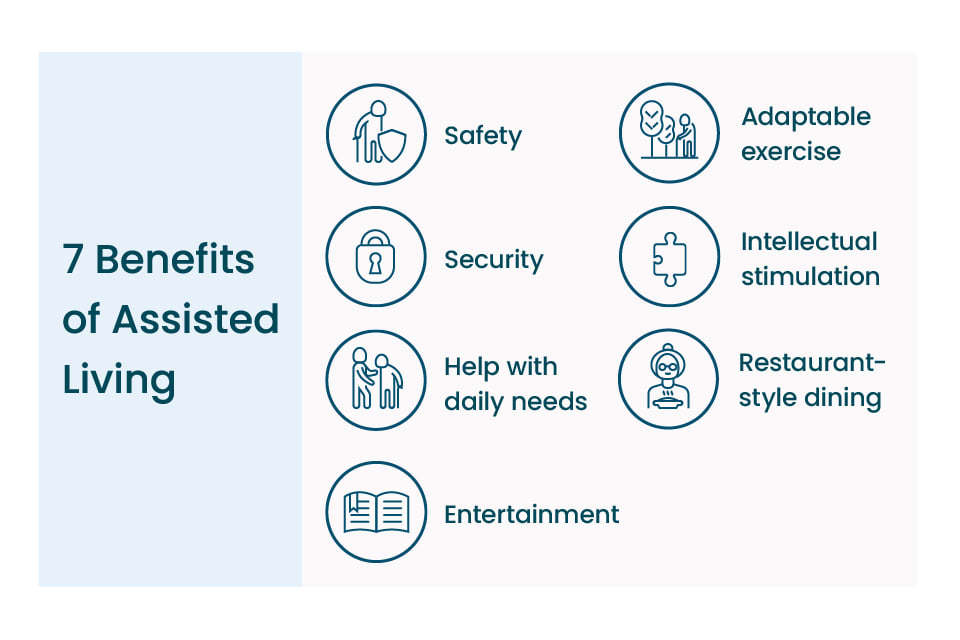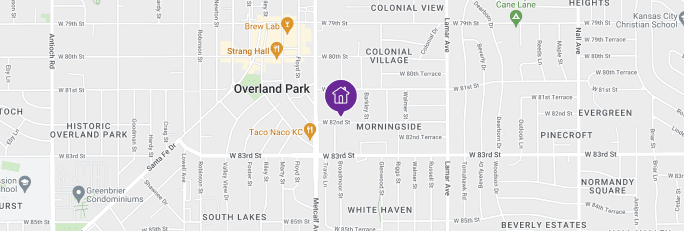Make the best senior care decision

7 Benefits of Assisted Living: Friendship, Food, Peace of Mind, and More

After a lifetime of working and caring for others, your senior loved one deserves the physical and mental well-being of a happy retirement. Assisted living communities offer social interaction, a full and productive lifestyle, safety, and just the right support for seniors who are largely independent but may need some daily care. There are a myriad of amenities in many communities, including beauty services, gourmet dining and fitness centers. Through these services as well as social activities, many seniors are finding that today’s assisted living communities provide convenience, happiness and improved quality of life.
Key Takeaways
- Assisted living provides socialization and stimulation. Activities and social programming keep seniors engaged and social.
- Assisted living offers residents a healthy lifestyle. Chef-prepared meals and on-site exercise classes encourage both body and brain health.
- Assisted living communities offer safety and security. Unique features help prevent falls, while alarms and security companies keep seniors safe.
- We can find nearby communities that suit unique preferences. Speak with one of A Place for Mom’s free senior living advisors to help guide you and your loved one to the best care type to fit their needs and interests.
In this Article
Consider these seven benefits of assisted living communities to understand how a move to assisted living could help your aging relative enjoy happiness and health.

No more boredom
After retirement, seniors may be overwhelmed by free time. These extra hours can be used to pursue passions or pick up new hobbies. One of the top benefits of assisted living is a number of activities that appeal to all walks of life. Consider these pursuits:
- Movie nights offer classic entertainment with old favorite films, popcorn, and snacks.
- Communal gardens give older adults the opportunity to spend time outside.
- Art and music classes teach new skills and encourage creativity.
- Poker and card tournaments engage seniors in friendly competition.
- Book clubs promote discussions between friends.

Get a tailored list of senior living options.
Our free tool provides senior living options based on your unique interests, needs, and budget.
The help seniors need, when they need it
One of the key assisted living benefits is help with activities of daily living (ADLs). This can mean anything from occasional assistance getting dressed to daily help bathing.
If an adult is independent when they move in but needs more care as they age, that assistance is available on-site and can be quickly arranged. Health-related benefits of assisted living communities include:
- Caregiver aid. Caregivers and nurses can help with a variety of daily activities, from bathing to escorting residents to dining areas and activities.
- Medication management. Keeping track of prescriptions ensures seniors take the right medicines at the right times of day, preventing dangerous mismanagement.
- Senior care coordination. Transportation to doctor’s appointments and some on-site medical services help seniors stay on top of important health care needs. Plus, nurses and staff members can evaluate health changes.
- On-call nurses or trained staff. Staff members are available and trained to respond to emergencies or contact ambulance transport.
Intellectual stimulation
Mental stimulation may lower the risk of dementia and long-term cognitive decline. Opportunities for lifelong learning are among the many benefits of assisted living facilities. From lending libraries and language lessons to woodworking shops, there are plenty of opportunities for seniors to stay engaged. Communities offer:
- Ways to combat dementia. Communities have access to stimulating resources and brain games designed to slow cognitive decline.
- Academic activities. Guest lecturers and local professors may come to assisted living communities to speak about popular topics like art history or flower arranging. Some communities are even situated on a campus.
- Technology assistance. Computer rooms and personal tablets are often available, and community staff can help seniors develop technical skills.
Safety features for seniors
Keeping seniors healthy and safe stands out as one of the main assisted living benefits that spurs caregivers to seek a new home for their loved one. Safety-related advantages of assisted living facilities include:
- Minimized fall risks. Falls can lead to serious injuries and health complications in seniors. Assisted living communities are designed for accessibility and mobility, with ramps, flat thresholds, and hallway hand railings.
- Safer bathrooms. Raised toilets, specially designed walk-in showers, and grab bars in bathrooms also reduce the likelihood of falls.
- On-call staff. Emergency call buttons in assisted living apartment communities are used to notify staff in case of falls or injuries. This means seniors don’t have to worry about struggling to contact help or waiting to be found after a medical event at home.

Assisted living facilities near you
There are facilities in your area
Increased security features
Seniors living alone may be more vulnerable to security risks. Some increased security features assisted living communities provide include:
- Alarms and security officers. Elderly people are often targets for break-ins and scams. Senior living communities utilize security companies and alarm systems to provide peace of mind.
- Disaster preparation. Elderly people aging in place are responsible for checking smoke detectors, installing carbon monoxide alarms, and replacing fire extinguishers. In the event of an emergency — like a tornado, earthquake, or fire — they might have to find safety on their own. Assisted living benefits from disaster plans and staff prepared to help seniors in case of emergency.
A healthy, restaurant-style dining experience
Elderly adults have unique nutrition needs, which can be quite a challenge to meet for seniors living at home. The task of preparing healthy, balanced meals may be the responsibility of family members, meal delivery services, or seniors themselves. Here’s what residents can typically expect in assisted living communities:
- All-inclusive dining. Residents can enjoy three meals a day plus snacks as a benefit of assisted living. These meals are generally served in a restaurant-style dining room or may be delivered to individual apartments when necessary.
- Healthy, balanced meals. Assisted living communities often have on-site dieticians and chefs who craft meals that support both body and brain health and incorporate important vitamins for seniors.
- Knowledge about special diets. Special diets are necessary for seniors with a variety of medical conditions. Assisted living chefs are familiar with low-sodium diets, diabetic needs, and diets for people with high cholesterol. Some communities may also offer vegetarian, halal, or kosher options.
A more active lifestyle, without the effort
A lack of exercise can lead to physical and mental decline. Keeping seniors active can benefit muscle and bone health and reduce the likelihood of falls. Physical activity keeps aging adults healthy longer, improves cognitive function, and is a great social outlet. Some physical benefits of assisted living include:
- On-site, convenient classes. Organizing transportation to fitness classes or physical therapy can be difficult. One of the advantages of assisted living facilities is that everything is located within the community, which makes attendance easy.
- Activities for every skill level and ability. Assisted living activity coordinators know that different seniors have different levels of physical ability. A dance class may include more complicated steps for residents who are mobile, as well as a chair component geared toward those with lower ranges of motion.
- Safe, supervised exercises. Coordinators know how to keep seniors safe and provide appropriate supervision during classes.
Pros and cons of assisted living
Assisted living is a great choice for many seniors looking for a relaxing, engaged retirement. However, it may not be the best care type for your loved one, depending on their individual care needs and interests.
Pro: Assisted living communities offer activities and classes adapted for seniors with almost all physical skill levels.
Con: Assisted living communities may not be able to support people with moderate to severe dementia. Memory care communities will have activities tailored to seniors with cognitive decline.
Pro: Assisted living residents have meals and snacks readily available in restaurant-style dining rooms.
Con: If your loved one loves to cook or is set on having a full kitchen, most assisted living communities only offer in-room mini fridges and microwaves for safety reasons.
Pro: Assisted living communities support seniors’ independence as much as possible by offering low-threshold doors, grab bars, and shower benches to reduce falls, as well as wheelchair-accessible hallways and amenity spaces.
Con: If your loved one is unable to eat independently or to transfer independently from their bed to their wheelchair, they may not qualify for assisted living admission. A personal home health aide or nursing home may be a better fit.
Pro: Most assisted living communities can help with medication management by reminding residents when to take their medicine throughout the day or by picking up prescriptions from a local pharmacy.
Con: Most assisted living aides and nurses aren’t legally allowed to help with more medical procedures, like insulin injection, wound care, or dialysis hookup. If your loved one needs assistance with these conditions but would like to stay in an assisted living community, they may have to hire an additional home health aide.
Pro: Assisted living communities offer assistance with ADLs like dressing and bathing.
Con: Some assisted living communities require residents to need help with a certain number of ADLs for admission. If your loved one is still able to fulfill all daily tasks, an independent living community may be a better fit.
Understand the benefits of assisted living for your loved one
If you think your family member could benefit from assisted living, reach out to one of A Place for Mom’s free Senior Living Advisors. They can help you understand the different care types and determine which type of community near you is the best fit for your loved one. Chat about your relative’s favorite hobbies and interests as well as their health needs for a personalized consultation.
Assisted living facilities near you
The information contained in this article is for informational purposes only and is not intended to constitute medical, legal or financial advice or create a professional relationship between A Place for Mom and the reader. Always seek the advice of your health care provider, attorney or financial advisor with respect to any particular matter and do not act or refrain from acting on the basis of anything you have read on this site. Links to third-party websites are only for the convenience of the reader; A Place for Mom does not recommend or endorse the contents of the third-party sites.